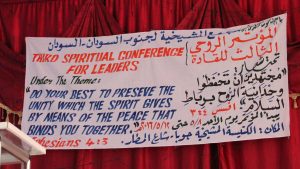
I didn’t grow up in a Christian family, but living in the Bible Belt of the United States meant that I wasn’t short of church experiences when I was a kid. For a long time the norms and traditions of the church felt strange and unfamiliar to me, and there were a lot of things about ‘doing church’ that I didn’t quite understand.
I remember the thing that seemed the oddest at the time was ‘passing the peace’. I learned very quickly what to say and do, but the reasons behind the custom didn’t make a lot of sense to me. After being a Christian for more than ten years, I still thought of passing the peace as some sort of nicety that we do as a means of encouraging fellowship and making one another feel at ease within the congregation. That is, until a trip to South Sudan made me see peace in a whole new light.

On my first full day in the capital Juba, I attended a peace and reconciliation workshop run by the Presbyterian Church of South Sudan, UnitingWorld’s partner church in the country. With pride of place right up the very front, my eyes couldn’t help but be drawn to the banner hanging in the middle of the stage. Written on it in both English and Arabic, was the theme of the training inspired by Ephesians 4:3:
“Do your best to preserve the unity which the spirit gives by means of the peace that binds you together.”
Reading that banner I started to think about peace and my experiences of it. In Australia, peace is abundant. And I often take it for granted. But sitting in that church hall in Juba, I started to really think about what it means when peace isn’t present in a place.

As Christians, we’re called to love our neighbours and forgive those who sin against us. We’re bound together in unity because of the peace that exists between one person and another. But how many of us in Australia have ever had to forgive someone who has killed their family member? Perpetrated a war crime? Violated a loved one? How many of us has ever looked into the eyes of someone who has wronged us and unconditionally offered them peace?
For the people of South Sudan, peace isn’t a passive state of being. Without the luxury of taking it for granted, they are constantly working towards peace. Fighting for peace. Praying for peace. Throughout the Bible, all of us are called to seek peace, and many faithful South Sudanese people are answering this call. But I wonder – are we answering?
When our typical experience is the absence of conflict – the reality for most Australians – it’s easy to forget what it means to seek peace, especially when the peace we’re seeking is halfway across the world. But seeking peace doesn’t mean we have to be in the room at the ceasefire negotiations. It doesn’t mean that we have to be the ones laying down arms.
Seeking peace takes many forms. It’s the prayer you say before bed every night. It’s the letter you write your MP asking them to put peace at the top of their agenda. It’s the monthly donation you put aside to support the ministers working towards reconciliation.
It’s passing the peace, not just to your immediate neighbour, but those sisters and brothers that are keeping faith and building a church of peace in the hard places of the world.
We can all make a difference. We are all peacemakers. And together we can help bring peace to South Sudan.
– Megan
Find out how you can support the Peacemakers of South Sudan: https://unitingworld.org.au/projects/peacebuilding-and-trauma-healing
